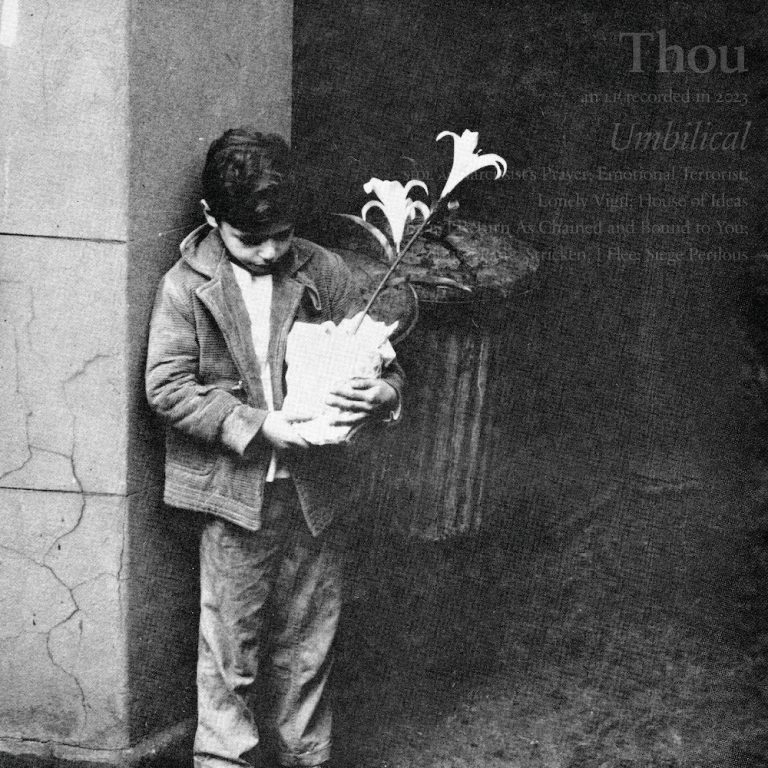Pop strives to conjure a prelapsarian world. Paradise can indeed be regained, if only for three glorious minutes, harmony restored by crystalline hooks, entrancing vocals. Metal, on the other hand, attests to that great tumble, the psychic exile from wholeness. The primary pulse of metal is unhealable loss, isolation, the scar of sin. Forsaken by the gods and nature alike, humans are bound by their base instincts, slaves to their egoic drives.
Since releasing Tyrant in 2007, Thou, hailing from steamy Baton Rouge, Louisiana, have forged reliably combative sonics, tortured vocals, and lyrics that portray humanity as pretty much a failed experiment, generation after generation navigating betrayals, injustice, and war. Having released five previous LPs, as well as collaborative projects with The Body (You, Whom I Have Always Hated was a 2015 standout) and Emma Ruth Rundle (2020’s May Our Chambers Be Full is a bona fide gem, 2021’s The Helm of Sorrow less compelling), Thou now release their latest studio venture, Umbilical. Bryan Funck is as feral as ever, though these tracks capture him intermittently pursuing melodic constructions. The band draw from diverse sources, notably 90s-ish stylistics, offering their most mainstream-leaning gestalts.
“Narcissist’s Prayer” launches with sludgy chords. Funck joins the roil, his voice like a blowtorch, nail gun, and chainsaw rolled into one. While his vocal is ultimately textural, evoking a sinister presence, a listener can make out such phrases as “blighted spirits so bereft” and “the mark of shame”, leaving no doubt that Thou, though entertaining a more compositional MO, remain committed to naming and broadcasting the horrors of history, including failed social contracts and shattered theologies.
“Emotional Terrorist” brims with dense and doom-laden tones yet points to Thou’s affinity with ‘Seattle’ bands Soundgarden and Alice in Chains. Funck, despite his bestial vocal, toys with a recognizable tune. He emanates a “super-jadedness” most immediately associated with the deceased Layne Staley. Guitar parts are built around collaged riffs and serrated lines that obliquely tip a hat to Kim Thayil and Jerry Cantrell (consider, too, Thou’s 2020 covers compilation, Blessings of the Highest Order, which illustrates the band’s debt to Nirvana).
Once Funck asserts himself on “I Feel Nothing When You Cry”, it’s difficult not to hear the track as a doom manifesto; beneath his growl, however, the band explore percussive patterns and chord progressions that touch on hardcore, punk, and revved-up grunge as much as approaches long connected with metal. “I Return as Chained and Bound to You”, meanwhile, sprawls a la earlier work. Drummer Tyler Coburn drags the beat as if he’s toting a steel crucifix up a steep hill. Funck is vomitous, lost in a savage reverie. His voice aptly dominates the mix, though his intensity throughout Umbilical occasionally eclipses instrumental forays that might stand on their own, enriching the set. That said, brief lulls and interludes point to the band’s ability to navigate diverse sounds.
“Panic Stricken, I Flee”, with its guitar-and-drum interchanges, recalls debut-era Rage Against the Machine, albeit if Morello and company were ingesting handfuls of speed and participating in a rage-room session. Lyrics such as “suppression and subservience” emerge from the clamor, phrases that underscore Thou’s dim portrait of human life, existence commodified through systematic conditioning. “Acceptance is a settlement”, Funck hisses. And so, like banished angels convinced that revenge leads to wholeness or possibly catharsis, we slam our heads against the closed doors that define our age.
If pop suggests that redemption is graspable, metal, and certainly Thou’s brand of metal, declares that position delusional. With Umbilical, Thou toe the doom-metal line re the inevitability of suffering/the urgent need for defiance while rummaging in an expanded playbook. The band flirt with songs and song structures, writhing, per usual, in a hellish din, Bryan Funck exuding immeasurable discontent.

